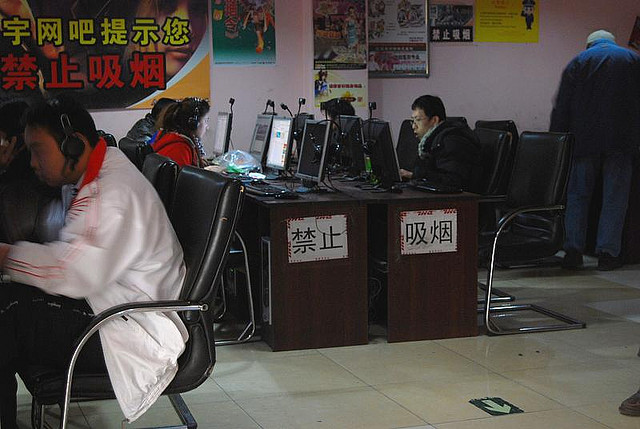A Guide to the Internet in China – Intro Posted by sasha on May 13, 2014 in Culture, News
Back in 1987, China sent out its first e-mail, an exchange between scientists in Beijing and Germany:
“Across the Great Wall, we can reach every corner of the world.”
越过长城,走向世界 – yuè guò cháng chéng, zǒu xiàng shì jiè
A few years later, in 1994, China was officially online. On April 20th, some nerds from China’s Academy of Sciences hooked up with other nerds over at Stanford in the US and just like that, the Middle Kingdom joined the World Wide Web. Twenty years later, it’s clear that the internet has had a massive impact on China, its economy, its people, and last but not least, its government. In a new series here on the Chinese Language & Culture Blog, we’re going to take a look at the past, present, and future of the ‘net in China.
http://www.youtube.com/watch?v=M17MsEXAIPc
Reflections on 20 years of Chinese internet.
Early Days of the Chinese Net
When China made the leap and joined the WWW, it was the 77th country to do so – not exactly pioneers. In the beginning, internet access was hard to come by. As connections could only be made by telephone through a modem, people needed a computer to get online. Simply put, the internet was slow and expensive. Back then, there were only around 2,000 computers in the entire country with access to the internet.
Things started changing quickly, though. China’s first web server and web pages were soon launched, and circuits were opened in Beijing and Shanghai through the American company Sprint. The now familiar domain of .cn was soon established, and China was on its way. However, the need for a computer still limited the amount of people online, but not for long.
In 1996, the first internet cafes in China were opened in major cities, allowing more people to get online without their own personal computer. By October of the next year, there were over 600,000 internet users in the country. Come summer of ’98, that number had jumped to over one million. Less than half a year later in the beginning of ’99, that number doubled. Six months later, and it doubled again – there were already 4 million internet users in China by July 1999. Do you see a trend developing here? Another huge thing happened in ’99 for the Chinese internet – the founding of Tencent QQ. Still wildly popular today, this was the first Chinese instant messaging service and it was a big game-changer.
Chinese Companies Cash In
With more and more people getting online, business was good. Early on in the new millennium, China’s major web portals – Sina, Netease, and Sohu, went public on Nasdaq. A few years later in 2005, China’s largest search engine – Baidu – experienced the biggest daily gain by a newcomer in five years on the Nasdaq. If you’ve read the news at all recently, then you’ve probably read that Chinese internet giant Alibaba is also planning on going public in the US this year. This proves that Chinese internet companies can and will seriously compete with their western counterparts such as Facebook and Google.
The business world is going crazy over this Alibaba IPO.
Most Internet Users in the World
In 2008, China surpassed the US as the country with the most internet users in the world, at just under 300 million. A mere five years later, and that number skyrocketed up to 618 million by the end of 2013. To put that into perspective, nearly half of China’s population is online. That also means China has more people online than the USA and the EU combined. With the rapid development of the mobile web and tablets, more and more Chinese are going online and staying there throughout the day. In fact, 80% of Chinese internet users – or about 500 million people – browse the web from a mobile device.
Modern Times
With so many people online in China, what exactly are they doing? The Top 3 of Chinese internet has to be – social networks, e-commerce, and gaming. While many popular social networking sites such as Facebook and Twitter are blocked in China, their Chinese equivalents – Sina Weibo and WeChat – boast millions upon millions of users. When you see people in China snapping selfie after selfie, you can rest assured those are being sent out on social media immediately. Always the business-savvy bunch, it should also come as no surprise that e-commerce has exploded in China. Everyone is trying to get a piece of the action by getting into the online business world. Last but not least, those internet cafes that you see packed to the brim with chain-smoking Chinese teenagers in the wee hours of the morning can only mean one thing – some serious online gaming. The industry is huge in China, and it continues to grow at a staggering rate.
http://www.youtube.com/watch?v=_cywVDheJj8
Get some fascinating stats about the ‘net in China with this video from The Economist.
Stay tuned to the blog in the months to come as we dive deeper into all things related to the Chinese internet. We’ll talk about censorship and government control, give you a guide to popular social media sites, learn some online slang, and of course check out tons of videos and photos.

Build vocabulary, practice pronunciation, and more with Transparent Language Online. Available anytime, anywhere, on any device.
About the Author: sasha
Sasha is an English teacher, writer, photographer, and videographer from the great state of Michigan. Upon graduating from Michigan State University, he moved to China and spent 5+ years living, working, studying, and traveling there. He also studied Indonesian Language & Culture in Bali for a year. He and his wife run the travel blog Grateful Gypsies, and they're currently trying the digital nomad lifestyle across Latin America.







Leave a comment: